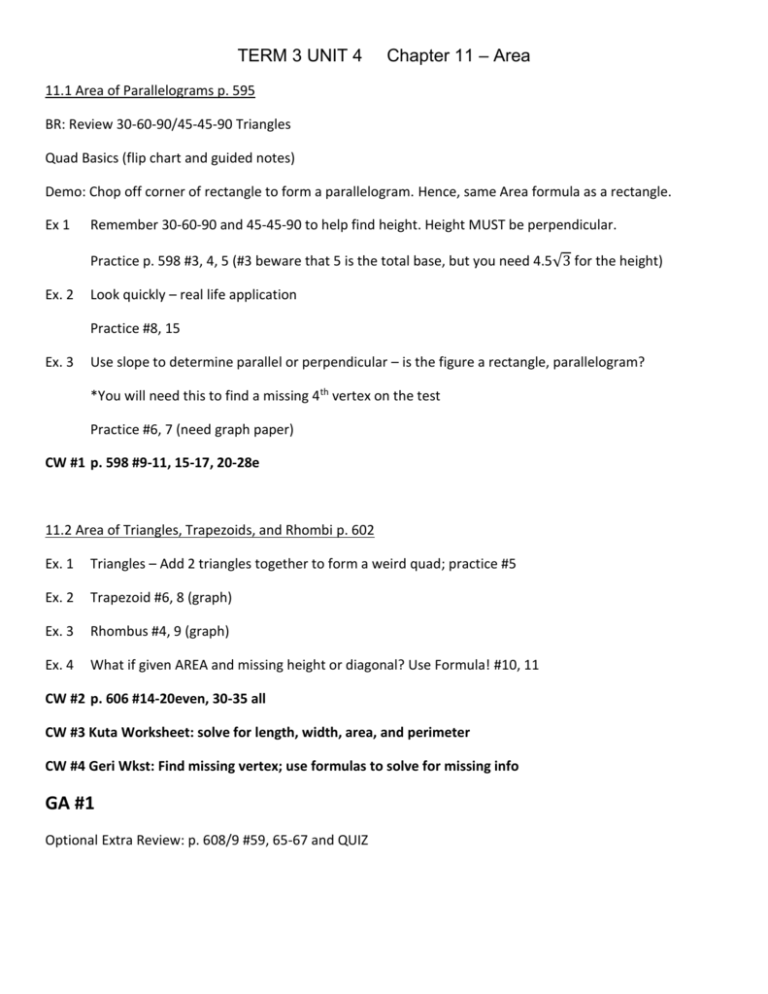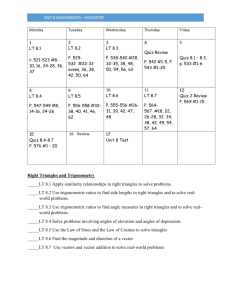Outline - Biloxi Public Schools
advertisement

TERM 3 UNIT 4 Chapter 11 – Area 11.1 Area of Parallelograms p. 595 BR: Review 30-60-90/45-45-90 Triangles Quad Basics (flip chart and guided notes) Demo: Chop off corner of rectangle to form a parallelogram. Hence, same Area formula as a rectangle. Ex 1 Remember 30-60-90 and 45-45-90 to help find height. Height MUST be perpendicular. Practice p. 598 #3, 4, 5 (#3 beware that 5 is the total base, but you need 4.5√3 for the height) Ex. 2 Look quickly – real life application Practice #8, 15 Ex. 3 Use slope to determine parallel or perpendicular – is the figure a rectangle, parallelogram? *You will need this to find a missing 4th vertex on the test Practice #6, 7 (need graph paper) CW #1 p. 598 #9-11, 15-17, 20-28e 11.2 Area of Triangles, Trapezoids, and Rhombi p. 602 Ex. 1 Triangles – Add 2 triangles together to form a weird quad; practice #5 Ex. 2 Trapezoid #6, 8 (graph) Ex. 3 Rhombus #4, 9 (graph) Ex. 4 What if given AREA and missing height or diagonal? Use Formula! #10, 11 CW #2 p. 606 #14-20even, 30-35 all CW #3 Kuta Worksheet: solve for length, width, area, and perimeter CW #4 Geri Wkst: Find missing vertex; use formulas to solve for missing info GA #1 Optional Extra Review: p. 608/9 #59, 65-67 and QUIZ 11-3 Area of REGULAR Polygons and Circles Areas of Regular Polygons = ½ Pa Explain “regular”; P = Perimeter; a = Apothem – segment from center, perpendicular to side” Ex 1 Demo “Imani’s process” step by step; practice #3, 4 Ex. 3 Irregular/Inscribed; practice #5, 6 Non-apothem problems, using 30-60-90 and 45-45- 90; p. 614 #5, 6, 14-18, #25 11-4 Area of Irregular figures *Tip – Break up an irregular figures in different ways to find the best combination of shapes that are easiest to work with. Ex 1 Practice #3, 4, 7 Ex 3 Practice #5, 6 Practice p. 619 #3-7 GA#2 Optional Extra Practice: 11-3 Study Guide & Practice Worksheets p. 621 Quiz CW #5 Matching Irregular shapes – Puzzle worksheet CW #6 Green ACT p. 286-7, p. 289 QUIZ May not have time for the quiz?? TEST 4



